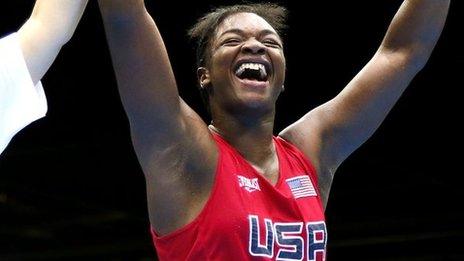Claressa Shields: From poverty & abuse to boxing greatness
- Published

Archive: The incredible story of Claressa Shields
Claressa Shields said she knew when she was 15 years old that she was going to be the best female boxer in the world.
Two years later, when the American won middleweight gold at London 2012, she proved it.
At Rio 2016, she became the first American boxer to successfully defend an Olympic title and achieved another milestone this month when she was the first woman to headline a boxing show on a premium network in the United States.
As part of the BBC's State of Sport week, she told Ade Adedoyin that boxing saved her life.

My childhood
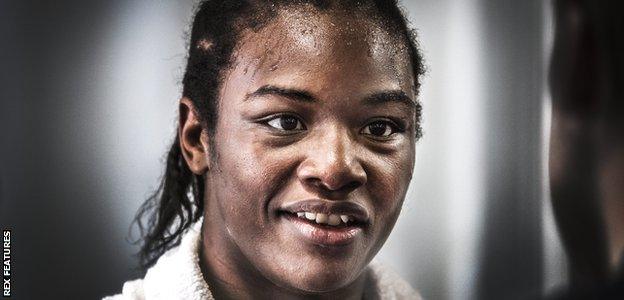
In Flint, 41% of the population live below the poverty line, according to the 2015 American Community Survey
I was born in Flint, Michigan in 1995, but I didn't start talking until I was five.
By then, my father had been in prison for three years for dealing drugs. I wouldn't meet him again for another four.
I'm not going to say my mum didn't care for us, but she left us to fend for ourselves. She abused alcohol and didn't know how to control it.
There were times my little sister and I would walk around looking for mum for days on end.
I'd have to go out and get food and whatever food we got I would always give to my younger siblings. If there were two packs of ramen noodles, my little sister ate one, my little brother ate one and I didn't eat.
We would sleep on the couch or the floor - and more than likely my sister or my brother was on the couch, so I would be on the floor.
Women's boxing: History-maker Claressa Shields tops the bill
Growing up and going without instilled an independence in me. I learned if anyone's going to take care of you, it's going to be you. You don't get upset about things, you just get used to it.
But you learn ways around it. You learn how to do little jobs for money - walking to the store for people and grabbing their groceries will get you about two dollars.
It was at this time, though, that I was raped. It happened every day for about six months by a person known to the family.
My aunt had never seen me cry. I was always a good, quiet child - but she saw fear in my eyes.
I couldn't speak well as a child - I had a speech impediment - so when she asked me what had happened, I wasn't able to say it. She gave me a doll and I was able to show her everything he had done to me.
I was kind of terrified of men for a while and my anger was really bad.
I was really quiet, smart and very skinny, but I got bullied when I was seven or eight. People would copy my work and make fun of me all the time because of my stutter.
One day I was at my desk and a girl walked past, said something and pulled my hair. I didn't do anything, just put my head down - but then this girl walked past and pulled my hair again. So I got up and I punched her. The feeling was one of relief.
I was kicked out for a couple of days, but when I came back to school nobody messed with me. So from that day, anybody who messed with me, I fought them.
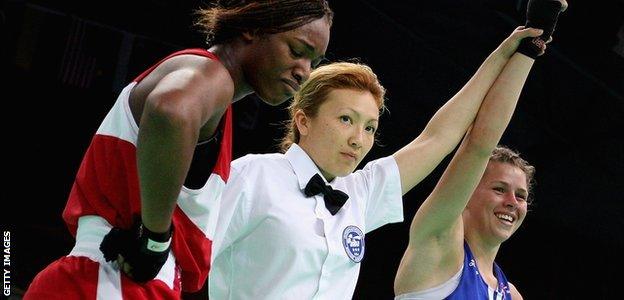
The only defeat on Shields' record came against England's Savannah Marshall (right) at the 2012 World Championships
Proving my dad wrong
My dad had been out of prison a couple of years by then and getting to know him definitely helped me understand things about myself.
I didn't know why I was easily angered before, but his temper is way worse than mine. In the same way, I didn't know why I laughed so loud, but he laughed just as hard as me.
One day we were in the city and he was very stressed out. He had been in prison for so many years and was trying to change his life, but wasn't getting any jobs or opportunities.
"If I stuck to what I was passionate about, I wouldn't be in this situation," he said.
"What were you passionate about?" I asked.
"Boxing," he replied. "They used to call me cannonball because my fist was hard and I was fast as lightning."
He said he thought some of my cousins would take up the sport, but none did.
He mentioned that of Muhammad Ali's nine children only his daughter Leila Ali took up boxing - and when he said that I thought he was asking me to take after him, so I headed to the gym at Berston Field House in Flint.
After about three days down there my coach Jason said my parents had to sign me up.
My dad said: "No! Boxing is a man's sport and you're too pretty to box."
"What the hell are you talking about?" I said. "I'm not going to be a model. I'm not going to be a singer. I'm going to be some type of athlete - and I want to be a boxer."
A few days later, I went to his house and it was like an intervention. Him, his wife and her three kids were sitting at this table in the dining room and they all voted on if I should box or not.
Everybody else said yeah, he said no. That was my first victory. I beat my dad, majority decision.
He said that once he signed me up and paid my $60 membership, I couldn't quit boxing for a year.
My dad will tell you today that was the best $60 he ever spent.
Olympic glory
Teenager Shields wins boxing gold for US
Six years later, I was going to London 2012.
I was a 25-1 shot and they are not good odds. I heard some commentators say that, at 17, I would be lucky to get a bronze medal.
I watched the Russian Nadezda Torlopova win her semi-final and thought there is no way she can beat me. They always say the Russians are strong, though, and I felt like the female Rocky.
When the announcer said "the winner, from the United States" I just remember being calm.
I felt vindicated. I had told people and I had shown people.
I held in how much I wanted to celebrate 2012 for four years. I didn't go to the club or celebrate with friends. I was back in the gym three months later.
Before Rio 2016, I kept hearing that no American boxer had ever defended an Olympic title.
Not Joe Frazier, not George Foreman not Pernell Whitaker, not Oscar de la Hoya, not Leon Spinks - but I would say: "Well, I ain't them."
Reporters would comment on how confident I was, but if you believe in yourself and work hard, how can you not be confident?
I worked harder than anyone around me, and I worked alone a lot. I didn't care about accolades or people saying you're working really hard. I did it for myself.
I knew I had checked my boxes. All of them. I knew I had it in the bag, it was just about going out there and doing it, those last little 10 steps.
I made the final fight look so easy. I was so calm and so dominant all fight.
When they announced the result, I grabbed the flag and just ran around screaming. My mind kind of left my body.
After all the things I had been through in my life, I just looked out on where I was. I was able to make it. It didn't stop me.
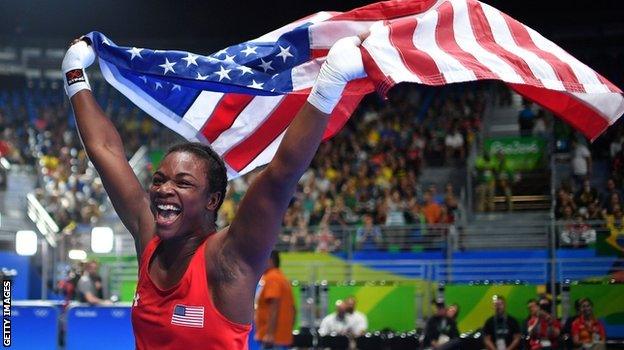
Shields did not drop a round in her Rio 2016 campaign
A reminder of the past
The last time I saw the man who raped me was when I was 16.
He was walking his dog. He looked at me and I looked at him.
Thank God he did have the dog. If he didn't I would have beaten him up and would have probably been in jail before I got a chance to go to the Olympics.
But you can't let something someone did to you - something that made you feel so worthless - stop your life.
I'm not going to let a man that evil and foul have control over me. I'm not going to let him be the decision-maker.
I could have made bad choices in life, but I was still in school, still boxing and still winning.
It didn't stop me from being great.

- Published24 March 2017
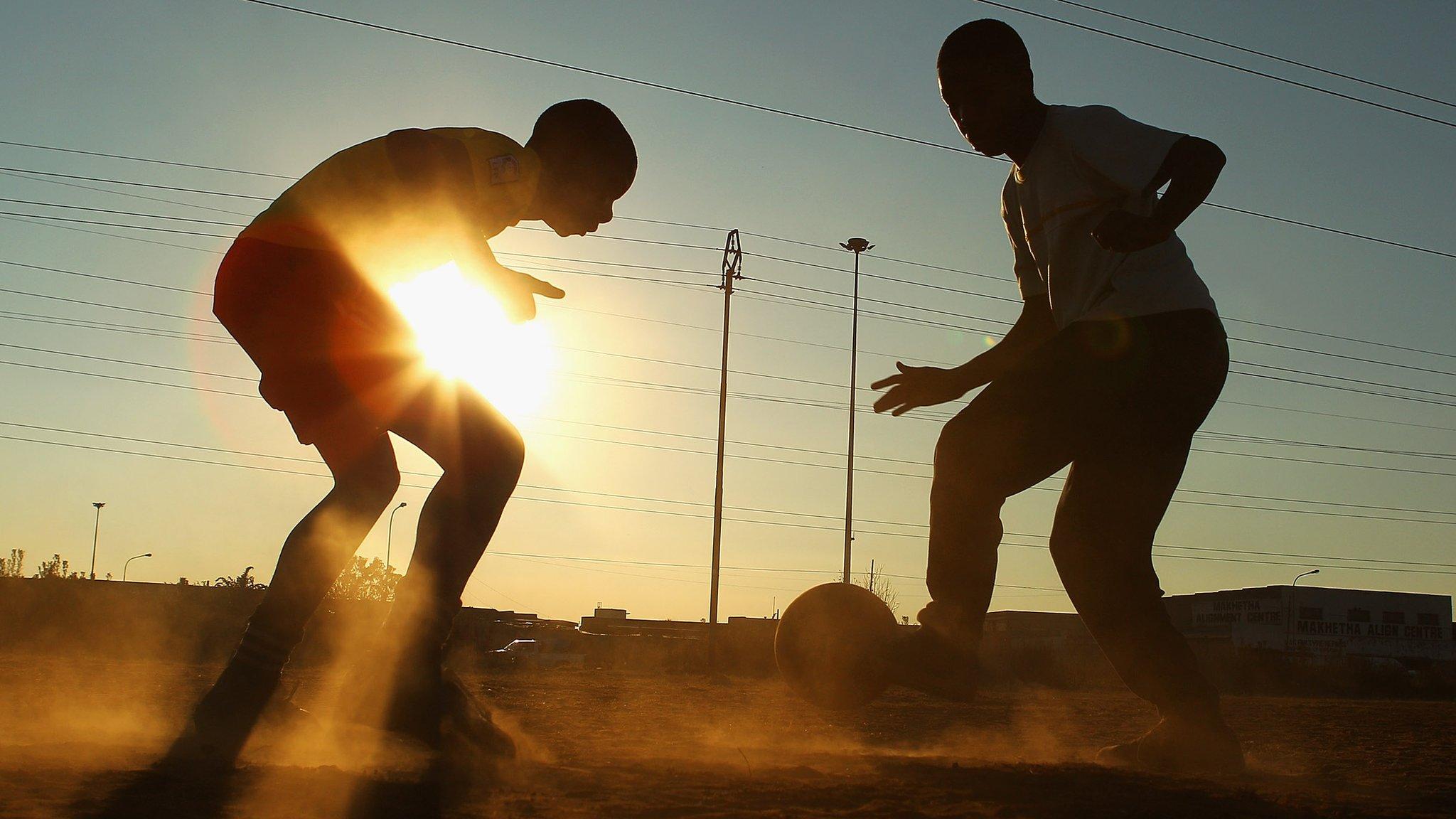
- Published11 March 2017
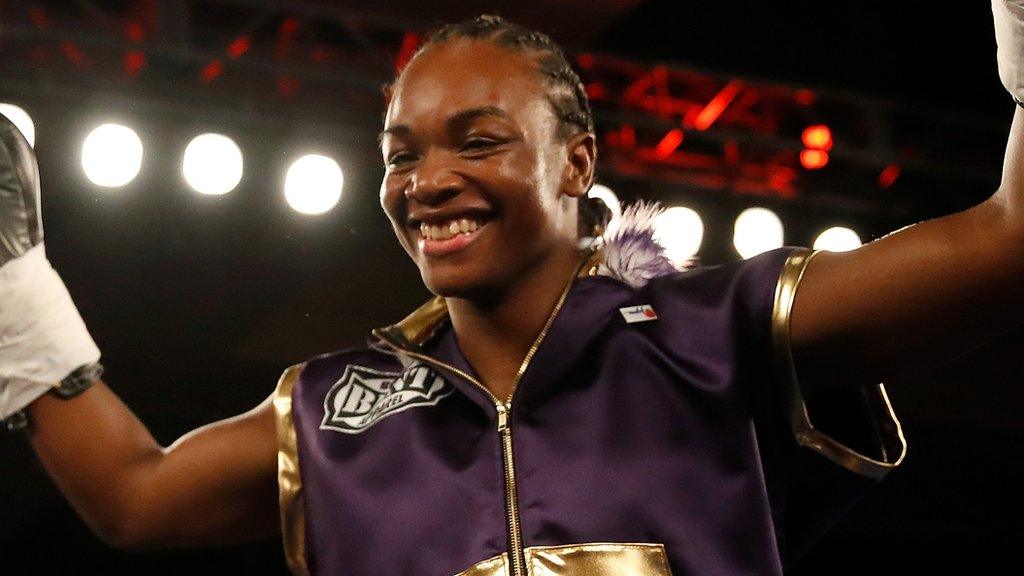
- Published21 August 2016
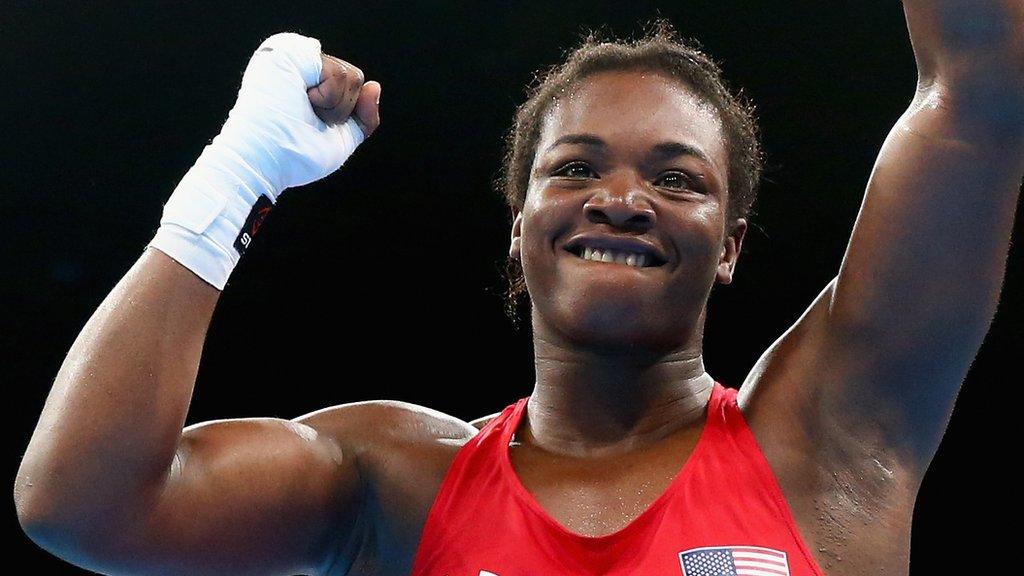
- Published9 August 2012
